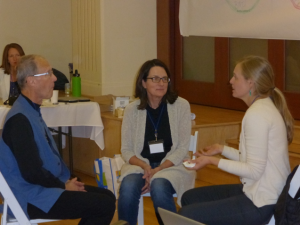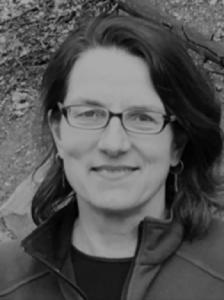By Nedra Chandler for EDRBlog.org

Looking out my window at the Wasatch mountains today, in my new role as associate director at the Stegner Center’s Environmental Dispute Resolution (EDR) Program, I am musing about what ‘societies to match our scenery’ might require. Wallace Stegner wrote in an essay in 1969 that:
“When [the West] fully learns that cooperation, not rugged individualism, is the quality that most characterizes and preserves it, then it will have achieved itself and outlived its origins. Then it has a chance to create a society to match its scenery.”
Do you agree with Stegner’s assertion? I do, and it explains why I am so glad to join the EDR Program and further our mission: to “promote a culture of collaboration in Utah and the Mountain West.” What a clear and compelling purpose—a breath of fresh air, and full of fluid, wicked questions.
When people are ready and situations are ripe for mutual gains and collaborative approaches, it’s usually because no one has any better alternatives to go it alone. A lot of these situations have wicked questions galore in them and, by definition, no single solution. Consider for a moment some of the public policy situations in the region that fit this description. Aspects of managing water, fire, and air come to my mind today. Co-managing across jurisdictions and sovereign governments also comes to mind.
Get notified when new articles are posted to the EDR blog – sign up for our email list »
‘Going it alone’ on transboundary or other complex public issues is usually outright impossible. While multiparty collaboration is, by its nature, never ‘simple,’ it can have some ease and lightness in it while generating paths forward. Often, the collaborative process itself becomes a significant resource. And there, within that complexity, lies possibility for innovation—opportunities to carry out what no one party could do unilaterally.
Through my training and continuing experience, I have come to accept that none of us really know where many of our complex public policy situations are headed next. And that admission in itself sets the best possible tone for process innovation.
I offer my take on why the EDR Program is here and 3 things we offer you.
- We Help You Pay Deliberate Attention to Process and Outcomes
Let’s not kid ourselves, collaboration is no panacea for all situations. I wonder what percent of all meetings in the world today alone that may have the label “collaborative” yet contain zero or few quality process elements that were designed and carried out in service to quality outcomes.
So why turn to collaborative process and developing our skills in collaboration? As we too often rush to solutions and swear we have no time for process to listen to each other and talk, we know that process begets outcomes. Therefore, quality process is most likely to beget quality outcomes.
- We Help You Turn Conflict into Collaboration by Design, Not Default
Each collaborative process and learning opportunity begins with conversations and/or using digital methods to check for relevance, chemistry and fit. What do participants need? What are they ready for next?
One thing I know through direct experience is that it will cost you, and everyone with a stake in the outcomes, to default to the status quo in the design of public conversations. It costs all of us to skip or rush the design phase. Assessment is important because it informs decisions on design, the key issues, and identifies wicked questions participants will need to address. Assessment plants the seeds for success, distributes participation and helps participants discover for themselves what methods will get their interests met.
At the EDR program I can already see that we are willing, and do, take deliberate risks on behalf of the process and outcomes participants need. We check to discern what you and others with a stake are ready for, and then, together, design a customized approach. Continuing to check in with participants as the process unfolds is also key because that makes room for participants and the facilitation team to adapt the process and mutual expectations if necessary.
- We Help You Turn Conflict into Collaboration by Staying Lively & Connected to Purpose
We know there’s a big unmet need for collaborative processes and structures that help people self-organize and develop their skills for dialogue and decision making, while sustaining and developing themselves and their work teams. There is plenty of work to spread around on this.
It’s easy to get burned out while participating in collaborative projects. We are here to help you and your group stay resilient, energetic, and connected to your purpose.
Call Us When You Need a Thinking Partner Along These Lines…
I want you to know I’m here, we’re here, and I want to know you—our blog readers and people interested in our work. Click here to see the criteria we currently use to select projects. I’d especially like to hear about what you are learning through your engagement with the range of adversarial and/or collaborative work in this region, what your current challenges are, and your take on how we might be of service in promoting a culture of collaboration in Utah and the Mountain West in 2020. My direct email is nedra.chandler@law.utah.edu.

Nedra Chandler is the associate director of the Environmental Dispute Resolution Program. She joined the Stegner Center’s EDR program in October 2019. Since 1990 she has mediated or facilitated more than 300 complex environmental and public policy conflicts in the western U.S. and nationally. She has a Master of Arts in geography from the University of Washington and a graduate certificate in public health from University of Montana. Nedra is a credentialed Associate Certified Coach through the International Coach Federation; a mediator on the U.S. Institute for Environmental Conflict Resolution’s National Roster of Conflict Resolution Professionals and Native Network; and a seasoned third-party workshop designer and facili-trainer.
